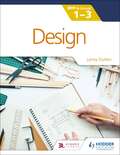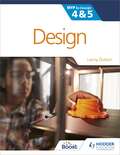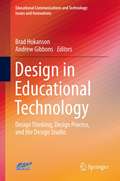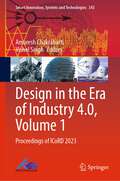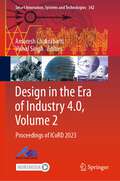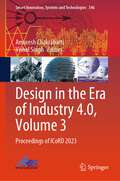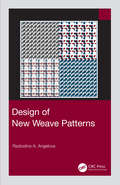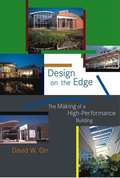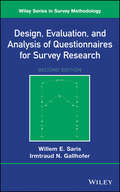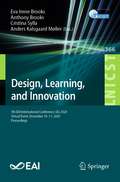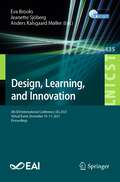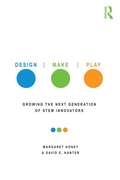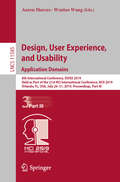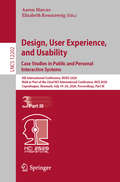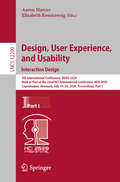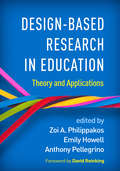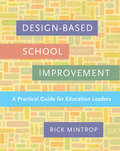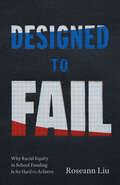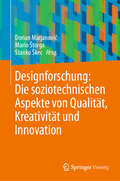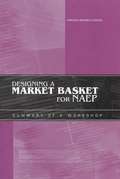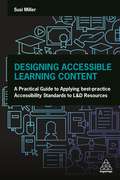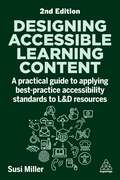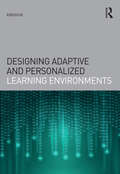- Table View
- List View
Design for the IB MYP 1-3: By Concept
by Lenny DuttonEnsure your students navigate the MYP framework with confidence using a concept-driven and assessment-focused approach to Design, presented in global contexts. - Develop conceptual understanding with key concepts and related concepts, set in global contexts, at the heart of each chapter. -Prepare for every aspect of assessment using support and tasks designed by an experienced educator. - Extend learning through research projects and interdisciplinary opportunities. - Apply global contexts in meaningful ways with an internationally-minded perspective. - Develop practical and creative-thinking skills to solve design problems with a statement of inquiry in each chapter. - Confidently cover the framework with chapters covering digital, product and combined design.
Design for the IB MYP 1-3: By Concept
by Lenny DuttonEnsure your students navigate the MYP framework with confidence using a concept-driven and assessment-focused approach to Design, presented in global contexts. - Develop conceptual understanding with key concepts and related concepts, set in global contexts, at the heart of each chapter. -Prepare for every aspect of assessment using support and tasks designed by an experienced educator. - Extend learning through research projects and interdisciplinary opportunities. - Apply global contexts in meaningful ways with an internationally-minded perspective. - Develop practical and creative-thinking skills to solve design problems with a statement of inquiry in each chapter. - Confidently cover the framework with chapters covering digital, product and combined design.
Design for the IB MYP 4&5: By Concept
by Lenny DuttonEnsure your students navigate the MYP framework with confidence using a concept-driven and assessment-focused approach to Design, presented in global contexts. - Develop conceptual understanding with key concepts and related concepts, set in global contexts, at the heart of each chapter. -Prepare for every aspect of assessment using support and tasks designed by an experienced educator. - Extend learning through research projects and interdisciplinary opportunities. - Apply global contexts in meaningful ways with an internationally-minded perspective. - Develop practical and creative-thinking skills to solve design problems with a statement of inquiry in each chapter. - Confidently cover the framework with chapters covering digital, product and combined design.Table Content: Unit 1 Global Goals Design Challenge Unit 2 Design to help people express their emotions Unit 3 Playground design Unit 4 Lights change lives Unit 5 Service promotion Unit 6 Gamified exercise Unit 7 Pedestrian safety Unit 8 The importance of toilets Unit 9 Human impact animation Unit 10 Play with the past Unit 11 Dealing with change Unit 12 Turning drawings into products
Design for the IB MYP 4&5: By Concept (MYP By Concept)
by Lenny DuttonEnsure your students navigate the MYP framework with confidence using a concept-driven and assessment-focused approach to Design, presented in global contexts. - Develop conceptual understanding with key concepts and related concepts, set in global contexts, at the heart of each chapter. -Prepare for every aspect of assessment using support and tasks designed by an experienced educator. - Extend learning through research projects and interdisciplinary opportunities. - Apply global contexts in meaningful ways with an internationally-minded perspective. - Develop practical and creative-thinking skills to solve design problems with a statement of inquiry in each chapter. - Confidently cover the framework with chapters covering digital, product and combined design.Table Content: Unit 1 Global Goals Design Challenge Unit 2 Design to help people express their emotions Unit 3 Playground design Unit 4 Lights change lives Unit 5 Service promotion Unit 6 Gamified exercise Unit 7 Pedestrian safety Unit 8 The importance of toilets Unit 9 Human impact animation Unit 10 Play with the past Unit 11 Dealing with change Unit 12 Turning drawings into products
Design in Educational Technology: Design Thinking, Design Process, and the Design Studio
by Brad Hokanson Andrew GibbonsThis book is the result of a research symposium sponsored by the Association for Educational Communications and Technology [AECT]. The fifteen chapters were developed by leaders in the field and represent the most updated and cutting edge methodology in the areas of instructional design and instructional technology. The broad concepts of design, design thinking, the design process, and the design studio, are identified and they form the framework of the book. This book advocates the conscious adoption of a mindset of design thinking, such as that evident in a range of divergent professions including business, government, and medicine. At its core is a focus on "planning, inventing, making, and doing." (Cross, 1982), all of which are of value to the field of educational technology. Additionally, the book endeavors to develop a deep understanding of the design process in the reader. It is a critical skill, often drawing from other traditional design fields. An examination of the design process as practiced, of new models for design, and of ways to connect theory to the development of educational products are all fully explored with the goal of providing guidance for emerging instructional designers and deepening the practice of more advanced practitioners. Finally, as a large number of leading schools of instructional design have adopted the studio form of education for their professional programs, we include this emerging topic in the book as a practical and focused guide for readers at all levels.
Design in the Era of Industry 4.0, Volume 1: Proceedings of ICoRD 2023 (Smart Innovation, Systems and Technologies #343)
by Amaresh Chakrabarti Vishal SinghThis book showcases cutting-edge research papers from the 9th International Conference on Research into Design (ICoRD 2023) – the largest in India in this area – written by eminent researchers from across the world on design processes, technologies, methods and tools, and their impact on innovation, for supporting design for a connected world. The theme of ICoRD’23 has been ‘Design in the Era of Industry 4.0’. Industry 4.0 signifies the fourth industrial revolution. The first industrial revolution was driven by the introduction of mechanical power such as steam and water engines to replace human and animal labour. The second industrial revolution involved introduction of electrical power and organised labour. The third industrial revolution was powered by introduction of industrial automation. The fourth industrial revolution involves introduction of a combination of technologies to enable connected intelligence and industrial autonomy. The introduction of Industry 4.0 dramatically changes the landscape of innovation, and the way design, the engine of innovation, is carried out. The theme of ICoRD’23 - ‘Design in the Era of Industry 4.0’ –explores how Industry 4.0 concepts and technologies influence the way design is conducted, and how methods, tools, and approaches for supporting design can take advantage of this transformational change that is sweeping across the world. The book is of interest to researchers, professionals, and entrepreneurs working in the areas on industrial design, manufacturing, consumer goods, and industrial management who are interested in the new and emerging methods and tools for design of new products, systems, and services.
Design in the Era of Industry 4.0, Volume 2: Proceedings of ICoRD 2023 (Smart Innovation, Systems and Technologies #342)
by Amaresh Chakrabarti Vishal SinghThis book showcases cutting-edge research papers from the 9th International Conference on Research into Design (ICoRD 2023) – the largest in India in this area – written by eminent researchers from across the world on design processes, technologies, methods and tools, and their impact on innovation, for supporting design for a connected world. The theme of ICoRD’23 has been ‘Design in the Era of Industry 4.0’. Industry 4.0 signifies the fourth industrial revolution. The first industrial revolution was driven by the introduction of mechanical power such as steam and water engines to replace human and animal labour. The second industrial revolution involved introduction of electrical power and organised labour. The third industrial revolution was powered by introduction of industrial automation. The fourth industrial revolution involves introduction of a combination of technologies to enable connected intelligence and industrial autonomy. The introduction of Industry 4.0 dramatically changes the landscape of innovation, and the way design, the engine of innovation, is carried out. The theme of ICoRD’23 - ‘Design in the Era of Industry 4.0’ –explores how Industry 4.0 concepts and technologies influence the way design is conducted, and how methods, tools, and approaches for supporting design can take advantage of this transformational change that is sweeping across the world. The book is of interest to researchers, professionals, and entrepreneurs working in the areas on industrial design, manufacturing, consumer goods, and industrial management who are interested in the new and emerging methods and tools for design of new products, systems, and services.
Design in the Era of Industry 4.0, Volume 3: Proceedings of ICoRD 2023 (Smart Innovation, Systems and Technologies #346)
by Amaresh Chakrabarti Vishal SinghThis book showcases cutting-edge research papers from the 9th International Conference on Research into Design (ICoRD 2023) – the largest in India in this area – written by eminent researchers from across the world on design processes, technologies, methods and tools, and their impact on innovation, for supporting design for a connected world. The theme of ICoRD’23 has been ‘Design in the Era of Industry 4.0’. Industry 4.0 signifies the fourth industrial revolution. The first industrial revolution was driven by the introduction of mechanical power such as steam and water engines to replace human and animal labour. The second industrial revolution involved introduction of electrical power and organised labour. The third industrial revolution was powered by introduction of industrial automation. The fourth industrial revolution involves introduction of a combination of technologies to enable connected intelligence and industrial autonomy. The introduction of Industry 4.0 dramatically changes the landscape of innovation, and the way design, the engine of innovation, is carried out. The theme of ICoRD’23 - ‘Design in the Era of Industry 4.0’ –explores how Industry 4.0 concepts and technologies influence the way design is conducted, and how methods, tools, and approaches for supporting design can take advantage of this transformational change that is sweeping across the world. The book is of interest to researchers, professionals, and entrepreneurs working in the areas on industrial design, manufacturing, consumer goods, and industrial management who are interested in the new and emerging methods and tools for design of new products, systems, and services.
Design of New Weave Patterns
by Radostina A. AngelovaThis book presents a systematic study on methods used for the creation of weave patterns for simple structures. Firstly, it explains known techniques for designing new weave patterns classified as patterns merge, motifs, patterns insertion and change of the displacement number. These are discussed as possibilities to create different textures and weaving effects supported by figures of patterns, colour view, and fabric appearance simulation. Secondly, it explains original methods for design of new weave patterns based on Boolean operations, musical scores, written texts and braille alphabet, including transformations performed, advantages/disadvantages, possible applications and designs.
Design, Evaluation, and Analysis of Questionnaires for Survey Research
by Willem E. Saris Irmtraud N. GallhoferDesign, Evaluation, and Analysis of Questionnaires for Survey Research, Second Edition explores updates on the statistical knowledge and development of survey questionnaires, including analyzing the important decisions researchers make throughout the survey design process. The new edition provides coverage of an updated SQP program, which has an expanded question database from the Multi-trait Multi-method (MTMM) experiments. This book aims to give students and survey researchers a state-of-the-art introduction to questionnaire design and how to construct questionnaires with the highest relevance and accuracy. The pitfalls of questionnaire design are outlined throughout the book, which alerts designers of questionnaires to the many prior decisions that will affect the quality of the research outcome. It is important to measure the quality of questions at the outset in order for students and researchers to consider the consequences and methods of achieving reliable and effective questions.
Design, Learning, and Innovation: 5th EAI International Conference, DLI 2020, Virtual Event, December 10-11, 2020, Proceedings (Lecture Notes of the Institute for Computer Sciences, Social Informatics and Telecommunications Engineering #366)
by Cristina Sylla Anthony Brooks Eva Irene Brooks Anders Kalsgaard MøllerThis book constitutes the refereed post-conference proceedings the 5th EAI International Conference on DLI 2020, Design, Leaning and Innovation, which took place in December 2020. Due to COVID-19 pandemic the conference was held virtually. The 14 revised full papers presented were carefully selected from 40 submissions and are organized in four thematic sessions on: digital technologies and learning; designing for innovation; digital games, gamification and robots; designs for innovative learning.
Design, Learning, and Innovation: 6th EAI International Conference, DLI 2021, Virtual Event, December 10-11, 2021, Proceedings (Lecture Notes of the Institute for Computer Sciences, Social Informatics and Telecommunications Engineering #435)
by Eva Brooks Anders Kalsgaard Møller Jeanette SjöbergThis book constitutes the refereed post-conference proceedings the 6th EAI International Conference on Design, Leaning and Innovation, DLI 2021, which took place in December 2021. Due to COVID-19 pandemic the conference was held virtually. The theme for DLI 2021 was “Shifting boundaries to discover novel ways and emerging technologies to realise human needs, ideas, and desires” targeting a conceptualisation of the effects and impact of digital technologies for, in an inclusive and playful way, fostering human beings to realising their needs, ideas and desires. The 17 revised full papers presented were carefully selected from 36 submissions and are organized in four thematic sessions on: digital technologies, design and learning; tools and models; artificial intelligence, virtual reality and augmented reality in learning; innovative designs and learning.
Design, Make, Play: Growing the Next Generation of STEM Innovators
by Margaret Honey David E. Kanter"Design, Make, Play: Growing the Next Generation of STEM Innovators is a resource for practitioners, policymakers, researchers and program developers that illuminates creative, cutting edge ways to inspire and motivate young people about science and technology learning. The book is aligned with the National Research Council's new Framework for Science Education, which includes an explicit focus on engineering and design content, as well as integration across disciplines. Extensive case studies explore real world examples of innovative programs that take place in a variety of settings, including schools, museums, community centers, and virtual spaces. Design, Make, and Play are presented as learning methodologies that have the power to rekindle children's intrinsic motivation and innate curiosity about STEM (science, technology, engineering, and mathematics) fields. A digital companion app showcases rich multimedia that brings the stories and successes of each program's and the students who learn there's to life"--
Design, User Experience, and Usability. Application Domains: 8th International Conference, DUXU 2019, Held as Part of the 21st HCI International Conference, HCII 2019, Orlando, FL, USA, July 26–31, 2019, Proceedings, Part III (Lecture Notes in Computer Science #11585)
by Aaron Marcus Wentao WangThe four-volume set LNCS 11583, 11584, 11585, and 11586 constitutes the proceedings of the 8th International Conference on Design, User Experience, and Usability, DUXU 2019, held as part of the 21st International Conference, HCI International 2019, which took place in Orlando, FL, USA, in July 2019.The total of 1274 papers and 209 posters included in the 35 HCII 2019 proceedings volumes was carefully reviewed and selected from 5029 submissions.DUXU 2019 includes a total of 167 regular papers, organized in the following topical sections: design philosophy; design theories, methods, and tools; user requirements, preferences emotions and personality; visual DUXU; DUXU for novel interaction techniques and devices; DUXU and robots; DUXU for AI and AI for DUXU; dialogue, narrative, storytelling; DUXU for automated driving, transport, sustainability and smart cities; DUXU for cultural heritage; DUXU for well-being; DUXU for learning; user experience evaluation methods and tools; DUXU practice; DUXU case studies.
Design, User Experience, and Usability. Case Studies in Public and Personal Interactive Systems: 9th International Conference, DUXU 2020, Held as Part of the 22nd HCI International Conference, HCII 2020, Copenhagen, Denmark, July 19–24, 2020, Proceedings, Part III (Lecture Notes in Computer Science #12202)
by Aaron Marcus Elizabeth RosenzweigThis book constitutes the refereed proceedings of the 9th International Conference on Design, User Experience, and Usability, DUXU 2020, held as part of the 22nd International Conference on Human-Computer Interaction, HCII 2020, in Copenhagen, Denmark, in July 2020. The conference was held virtually due to the COVID-19 pandemic. From a total of 6326 submissions, a total of 1439 papers and 238 posters has been accepted for publication in the HCII 2020 proceedings. The 51 papers included in this volume were organized in topical sections on interactions in public, urban and rural contexts; UX design for health and well-being; DUXU for creativity, learning and collaboration; DUXU for culture and tourism.
Design, User Experience, and Usability. Interaction Design: 9th International Conference, DUXU 2020, Held as Part of the 22nd HCI International Conference, HCII 2020, Copenhagen, Denmark, July 19–24, 2020, Proceedings, Part I (Lecture Notes in Computer Science #12200)
by Aaron Marcus Elizabeth RosenzweigThis book constitutes the refereed proceedings of the 9th International Conference on Design, User Experience, and Usability, DUXU 2020, held as part of the 22nd International Conference on Human-Computer Interaction, HCII 2020, in Copenhagen, Denmark, in July 2020. The conference was held virtually due to the COVID-19 pandemic.From a total of 6326 submissions, a total of 1439 papers and 238 posters has been accepted for publication in the HCII 2020 proceedings. The 40 papers included in this volume were organized in topical sections on UX design methods, tools and guidelines, interaction design and information visualization, and emotional design.
Design-Based Research in Education: Theory and Applications
by Zoi A. Philippakos, Emily Howell and Anthony PellegrinoEffective research in educational settings requires collaboration between researchers and school-based practitioners to codesign instruction and assessment, analyze findings to inform subsequent iterations, and make thoughtful revisions. This innovative reference and course text examines the theory and practice of design-based research (DBR), an important methodology for conducting studies in authentic educational contexts. Leading experts provide specific examples of high-quality DBR addressing different research foci, grade levels, and subject areas (literacy/English language arts, math, and science). Applications are presented for curriculum development, intervention, assessment, and digital contexts, as well as teaching second-language learners. Also addressed is DBR&’s role in educator preparation, professional development, dissertation research, and technical education.
Design-Based School Improvement: A Practical Guide for Education Leaders
by Rick MintropAt the heart of the effort to enact and scale up successful school reforms is the need for more robust links between research and practice. One promising approach is design development, a methodology widely used in other fields and only recently adapted to education, which offers a disciplined process for identifying practical problems, assessing evidence of outcomes, accounting for variability in implementation and results, and establishing a foundation for broader understanding of the problem and proposed solutions. This exciting new book provides a practical guide for education leaders who are seeking to address issues of equity in their schools and want to pursue this approach. The book provides a step-by-step description of the process, augmented by case studies of four education leaders:Christine, a middle school principal who is concerned with the volume of disciplinary referrals in her school;Michelle, an elementary school principal who wants to address achievement gaps;Eric, an assistant superintendent who wants to improve the quality of principals&’ instructional feedback to teachers; andNora, a high school principal who is concerned about the use of racial and homophobic slurs in the hallways.The book follows each of these leaders as they formulate and refine interventions to address these problems. Design-Based School Improvement also includes a series of &“excursions into theory&” that discuss the research basis for design-based improvement. The author—a leading thinker about policy implementation and school reform—shows a profound appreciation for the complexity of work in schools and the deep and sustained thinking entailed in undertaking productive change. By bringing theory to life and putting it in the hands of skilled practitioners, this book promises to become an invaluable resource for education leaders seeking to solve problems of equity and social justice in schools.
Designed to Fail: Why Racial Equity in School Funding Is So Hard to Achieve
by Roseann LiuA provocative examination of how systemic racism in education funding is sustained. For people who care about urban school districts like Philadelphia’s, addressing the challenges that these schools face often boils down to the need for more money. But why are urban districts that serve Black and Brown students still so perennially underfunded compared to majority-white ones? Why is racial equity in school funding so hard to achieve? In Designed to Fail, Roseann Liu provides an inside look at the Pennsylvania state legislature and campaigns for fair funding to show how those responsible for the distribution of school funding work to maintain the privileges of majority-white school districts. Liu analyzes how colorblind policies, political structures, and the maintenance of the status quo by people in power perpetuate wide and deepening racial disparities in education funding. Taking a lesson from community organizers fighting for a racially equitable school funding system, Liu’s work is a bold call to address structural racism at the root and organize from a place of abundant justice.
Designforschung: Die soziotechnischen Aspekte von Qualität, Kreativität und Innovation
by Mario Štorga Dorian Marjanović Stanko ŠkecDas Buch bietet einen ganzheitlichen Einblick in die Designforschung, eine umfassende und zusammenhängende Vision des neuesten Wissens über die Schaffung und Verbesserung hochwertiger Produkte, Kreativität und Innovation. Die Beiträge in diesem Band dienen als erhellender Kompass für das Verständnis der Ingenieurdesignforschung und bieten eine umfassende Perspektive auf Produktentwicklung, Kreativität, Innovation, Erfindung und Produktivität, indem sie die historische Entwicklung der Designwissenschaft aufzeigen und die Grenzen der Ingenieurdesignforschung erkunden. Die vorgestellten Bildungsprojekte wurden an EU-Universitäten durchgeführt und bieten Einblicke für zukünftige Designkurse. Zentral in den Diskussionen ist die entscheidende Rolle der soziotechnischen Dimensionen im Ingenieurdesign, wobei Fragen der Kreativität, Qualität, menschzentrierter Methoden und der Anforderungen neuer Technologien erörtert werden, die ihre entscheidende Rolle für den Erfolg des Ingenieurdesigns betonen. Der Text bietet einen panoramischen Überblick über den aktuellen Stand der Designforschung und kritische Themen und liefert eine umfassende Übersicht für junge Forscher. Pädagogen und Mentoren werden ihr Wissen vertiefen, während Experten ihre Methoden und Werkzeuge verfeinern.
Designing A Market Basket For Naep: Summary Of A Workshop
by Committee on NAEP Reporting Practices: Investigating District-Level Market-Basket ReportingThe National Academies Press (NAP)--publisher for the National Academies--publishes more than 200 books a year offering the most authoritative views, definitive information, and groundbreaking recommendations on a wide range of topics in science, engineering, and health. Our books are unique in that they are authored by the nation's leading experts in every scientific field.
Designing Accessible Learning Content: A Practical Guide to Applying best-practice Accessibility Standards to L&D Resources
by Susi MillerMaking learning and development (L&D) content inclusive and accessible for everyone is not only a good thing to do, it's the right thing to do. Designing Accessible Learning Content provides evidence-based advice on designing digital learning content that ensures all learners are included and are therefore able to perform to their full potential.This is a practical guide on accessibility for anyone involved in the design, creation, development or testing of online learning content. It provides detailed guidance on how to meet the Web Content Accessibility Guidelines making it essential reading for L&D professionals, instructional designers and course developers who need to comply with legal accessibility requirements. Using the author's 'eLearning Accessibility Framework', Designing Accessible Learning Content demystifies sometimes complex technical accessibility standards and provides an easy to follow contextual framework uniquely designed for learning content created using any authoring tool.This book also demonstrates how creating accessible learning content can improve usability and provide the best possible learning experience for everyone. In addition, it offers essential background information such as a focus on disability, an overview of assistive technology and an exploration of the case for digital accessibility. This guarantees that L&D professionals have the vital background knowledge they need to make sense of accessibility before they begin practically applying the principles. With online checklists, learner case studies, and industry perspectives, Designing Accessible Content is an essential handbook for all L&D professionals seeking to harness the benefits of accessibility in order to improve their learning content for everyone.
Designing Accessible Learning Content: A Practical Guide to Applying best-practice Accessibility Standards to L&D Resources
by Susi MillerMaking learning and development (L&D) content inclusive and accessible for everyone is not only a good thing to do, it's the right thing to do.Designing Accessible Learning Content is a practical guide on accessibility for anyone involved in the design, creation, development or testing of online learning content. Now updated to include detailed guidelines on the Web Content Accessibility Guidelines and the nine new standards, this book provides HR and OD professionals and academics with evidence-based advice on designing inclusive digital learning content.Featuring real-world examples from industry-leading brands, this book demonstrates how accessible learning content can improve usability and provide the best possible learning experience for all. It is an essential handbook for all L&D professionals seeking to harness the benefits of accessibility in order to improve their learning content for everyone.
Designing Adaptive and Personalized Learning Environments (Interdisciplinary Approaches to Educational Technology)
by KinshukDesigning Adaptive and Personalized Learning Environments provides a theoretically-based yet practical guide to systematic design processes for learning environments that provide automatic customization of learning and instruction. The book consists of four main sections: In "Introduction and Overview," the concepts of adaptivity and personalization are introduced and explored in detail. In "Theoretical Perspectives with Example Applications," various theoretical concepts underlying adaptive and personalized learning are discussed, including cognitive profiling, content-based adaptivity, exploration-based adaptivity, and mobile and ubiquitous settings. In "Practical Perspectives with Example Applications," the implementation process for adaptive and personalized learning environments is described, followed by application in various contexts. In "Validation and Future Trends," various evaluation techniques for validating the efficiency and efficacy of adaptive and personalized learning systems are discussed. This final section concludes with a discussion of emerging trends in adaptive and personalized learning research. Based on cutting-edge research, Designing Adaptive and Personalized Learning Environments is appropriate as a primary textbook for both undergraduate and graduate courses focused on the design of learning systems, and as a secondary textbook for a variety of courses in programs such as educational technology, instructional design, learning sciences, digital literacy, computer based systems, and STEM content fields.
